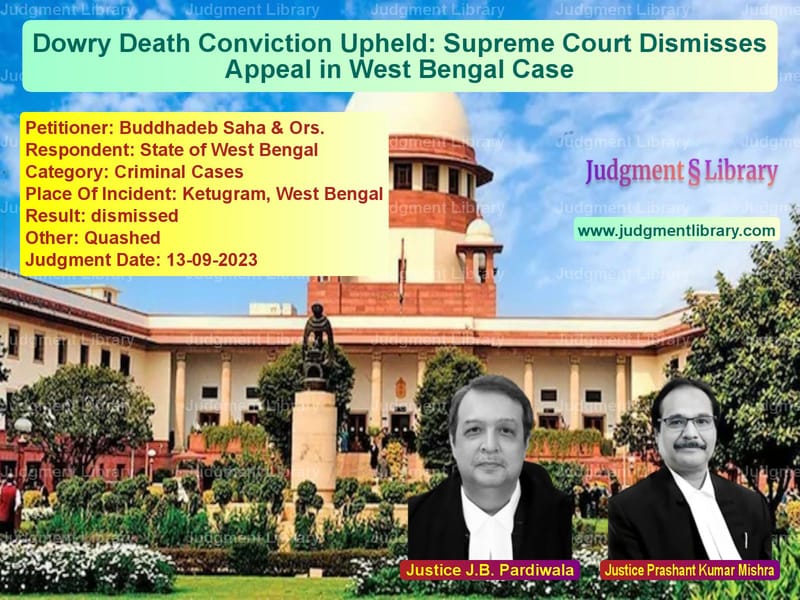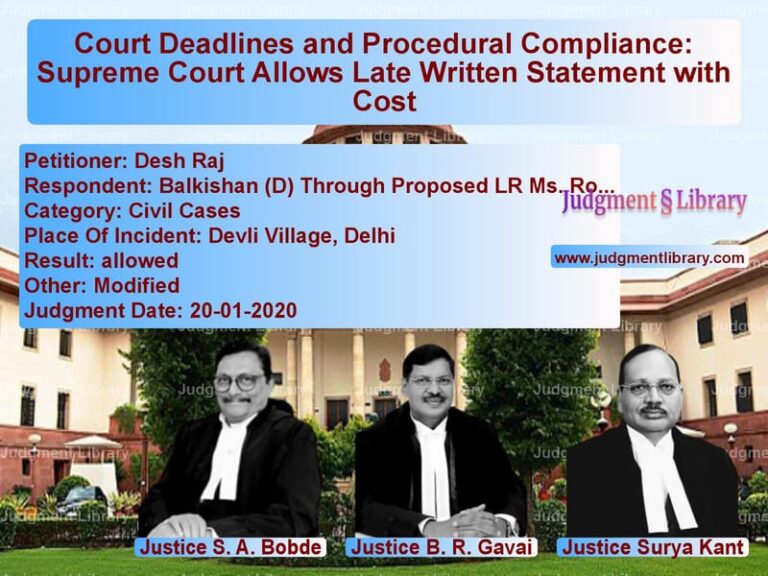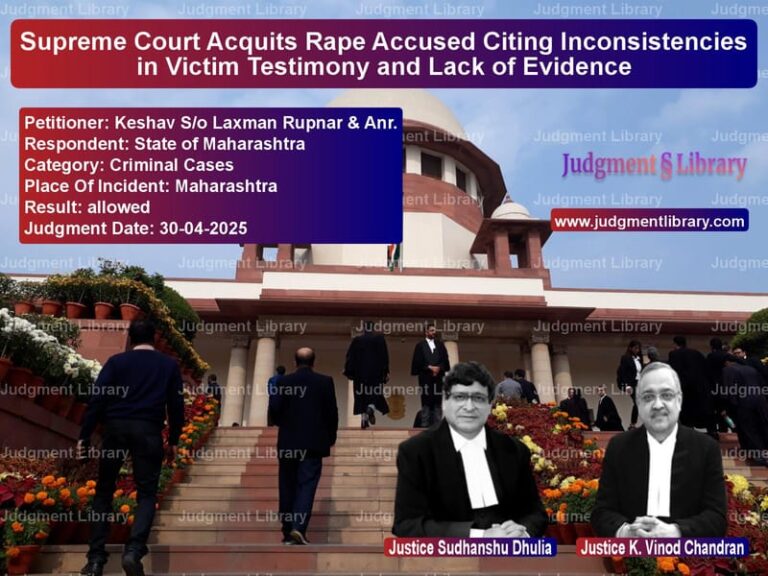Dowry Death Conviction Upheld: Supreme Court Dismisses Appeal in West Bengal Case
The Supreme Court of India recently delivered a significant judgment in the case of Buddhadeb Saha & Ors. vs. State of West Bengal, affirming the conviction of the appellants under Sections 498A and 304B of the Indian Penal Code (IPC). The case revolved around the unnatural death of Tuli Shah, a young woman who died within months of her marriage under suspicious circumstances.
The Supreme Court upheld the findings of the Trial Court and the Calcutta High Court, emphasizing that circumstantial evidence and the legal presumption under Section 113B of the Indian Evidence Act supported the prosecution’s case. The Court dismissed the appeal, reinforcing the judiciary’s commitment to combating dowry-related crimes.
Background of the Case
The case stemmed from the tragic death of Tuli Shah, who was found dead on September 16, 2011, at her matrimonial home in Ketugram, West Bengal. Her uncle, Uma Shankar Shah (PW-1), filed an FIR alleging that Tuli was harassed for dowry and ultimately driven to commit suicide by consuming poison.
Key Details:
- Marriage: Tuli was married to Buddhadeb Saha on February 24, 2011.
- Allegations: Her in-laws allegedly harassed her for additional dowry despite her family providing cash and gold ornaments at the time of marriage.
- Cause of Death: The prosecution claimed she consumed poison due to relentless harassment.
- Trial Court Verdict: All accused were convicted under Sections 498A and 304B IPC, sentenced to three years’ imprisonment for cruelty and seven years for dowry death.
- High Court Verdict: The conviction was upheld.
The accused, including Buddhadeb Saha (husband), his parents, and younger brother, appealed the conviction before the Supreme Court.
Key Legal Issues Considered
- Whether the prosecution established that the deceased was harassed for dowry shortly before her death.
- Whether the conviction under Section 304B IPC (dowry death) was justified despite the lack of direct evidence of poisoning.
- Whether the presumption under Section 113B of the Evidence Act applied to the case.
Petitioner’s Arguments (Buddhadeb Saha & Ors.)
The appellants, represented by their counsel, argued that:
- The prosecution failed to establish the exact cause of death since the viscera report did not confirm poison ingestion.
- There was no direct evidence of dowry harassment; the allegations were vague and unsubstantiated.
- The post-mortem report was inconclusive regarding the cause of death.
- The accused had already served six years of their sentence and, at best, should have been convicted only under Section 498A IPC (cruelty).
Respondent’s Arguments (State of West Bengal)
The prosecution, represented by Mr. Avishkar Singhvi, countered these claims by stating:
- The deceased was subjected to persistent harassment, and her unnatural death within months of marriage triggered the legal presumption under Section 113B of the Evidence Act.
- Although the viscera report did not detect poison, the post-mortem findings and circumstantial evidence pointed to poisoning.
- The inquest report noted that froth was coming out of the victim’s nose and mouth, indicating poisoning.
- The delay in sending the viscera sample for forensic examination likely led to inconclusive results.
Supreme Court’s Analysis
The Supreme Court examined the key legal principles related to dowry deaths and found that:
- The prosecution was not required to establish the exact cause of death if circumstantial evidence strongly suggested poisoning.
- The burden of proof shifted to the accused under Section 113B of the Evidence Act since the death occurred within seven years of marriage.
- The inquest report and forensic findings indicated symptoms consistent with poisoning.
- The trial court’s conclusion that the deceased was harassed and driven to suicide was reasonable.
The Court observed:
“If a woman dies an unnatural death within seven years of marriage, and it is shown that she was subjected to cruelty or harassment for dowry soon before her death, the presumption under Section 113B of the Evidence Act applies.”
Regarding the lack of poison detection in the viscera report, the Court referred to previous rulings that held:
“Failure to detect poison does not negate the possibility of poisoning, especially when post-mortem findings and circumstantial evidence support it.”
Final Judgment
The Supreme Court dismissed the appeal and upheld the conviction, ruling that:
- The appellants were guilty of dowry death under Section 304B IPC.
- The presumption under Section 113B of the Evidence Act was valid and applicable.
- The prosecution successfully proved that the deceased was harassed for dowry before her death.
- The accused, if currently in jail, must serve the remainder of their sentence.
The Court concluded:
“The appeal fails and is hereby dismissed.”
Implications of the Judgment
- Reinforces legal provisions protecting women from dowry harassment.
- Strengthens the applicability of Section 113B of the Evidence Act in dowry death cases.
- Emphasizes that courts must consider circumstantial evidence even if forensic reports are inconclusive.
- Deters dowry-related violence by ensuring strict legal enforcement.
Conclusion
The Supreme Court’s ruling in this case reaffirms the judiciary’s commitment to protecting women from dowry-related abuse. By upholding the conviction despite the absence of a conclusive viscera report, the Court emphasized the importance of circumstantial evidence and legal presumptions in cases of dowry deaths. The judgment serves as a crucial precedent for future cases, ensuring that justice is not denied due to technical shortcomings in forensic investigations.
Petitioner Name: Buddhadeb Saha & Ors..Respondent Name: State of West Bengal.Judgment By: Justice J.B. Pardiwala, Justice Prashant Kumar Mishra.Place Of Incident: Ketugram, West Bengal.Judgment Date: 13-09-2023.
Don’t miss out on the full details! Download the complete judgment in PDF format below and gain valuable insights instantly!
Download Judgment: buddhadeb-saha-&-ors-vs-state-of-west-bengal-supreme-court-of-india-judgment-dated-13-09-2023.pdf
Directly Download Judgment: Directly download this Judgment
See all petitions in Dowry Cases
See all petitions in Murder Cases
See all petitions in Judgment by J.B. Pardiwala
See all petitions in Judgment by Prashant Kumar Mishra
See all petitions in dismissed
See all petitions in Quashed
See all petitions in supreme court of India judgments September 2023
See all petitions in 2023 judgments
See all posts in Criminal Cases Category
See all allowed petitions in Criminal Cases Category
See all Dismissed petitions in Criminal Cases Category
See all partially allowed petitions in Criminal Cases Category







